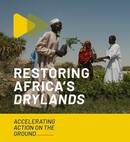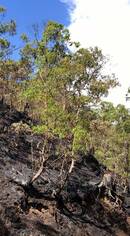News

Within the vast borders of Kazakhstan, the world’s ninth largest country, about two million families earn a living from the dairy sector. Small-scale farmers who own fewer than five cows produce 80 percent of the country’s raw milk.
Kazakhstan’s dairy industry has significant potential for growth, but it still faces many challenges. The country has been a member of the Eurasian Economic Union (EAEU) since 2015. As such, to stay competitive, its dairy farmers need to be able to supply domestic companies with raw milk that meets rigorous EAEU food safety standards.
But Kazakhstan is vast and milk collection centres sparse. Distances...

Technology and innovation for restoration monitoring is rapidly advancing supported by developments in geospatial technology and imagery. If deployed effectively across critical landscapes, these technical solutions for restoration planning and monitoring can drive restoration actions on the ground and contribute significantly to meeting the ambitious targets of the restoration, biodiversity and climate agendas. This session will spotlight key solutions and highlight ongoing challenges in ecosystem restoration monitoring with a focus on drylands. The session will feature a soft launch of the Framework For Ecosystem Restoration Monitoring (FERM) with a special focus on the integration and implementation of the Drylands Restoration...
Tracking forest fires from above
13/05/2021
13/05/2021

Every year, deliberately set fires and wildfires burn millions of hectares of forests and other types of vegetation around the world. In 2015, approximately 98 million hectares of forest were affected by fires (FAO, 2020). These fires occurred mainly in the tropics, where they damaged about 4 percent of the forest area.
The immediate and long-term impacts of wildfires can be devastating to communities, economies and forest ecosystems. The increase in forest wildfires around the world also threatens the long-term permanence of carbon stocks in all types of forests, forest regeneration and restoration projects. Many countries in Asia-Pacific are vulnerable to...

Bonn, Germany. 11 May 2021 – Today, 14 global entities launched a renewed effort to increase data-driven climate action around the world. With the decisive UN Climate Change Conference (COP26) in Glasgow, UK only six months away, the #Data4BetterClimateAction campaign aims to raise awareness about the inherent value of transparency in pursuing meaningful climate action and support.
Urging governments to reframe the way they think of “transparency”, the campaign highlights how enhanced transparency can support countries to address domestic development priorities while fulfilling their international climate commitments at the same time.
With only 57 countries – representing 60 percent of global emissions – ...

Strengthening the institutional and technical capacities of Cuba in the sectors of agriculture, forestry and other land uses to improve transparency under the Paris Agreement, is the purpose of a new project in Cuba, financed by the Global Fund for the Environment (GEF), in association with the Ministry of Agriculture of Cuba (MINAG) and FAO.
Launched at a start-up workshop held this Tuesday and Wednesday in Havana, CBIT plans to implement a program for the creation and strengthening of technical capacities, which will provide important tools and specialized training to Cuban institutions responsible for this issue, to respond to transparency requirements....

